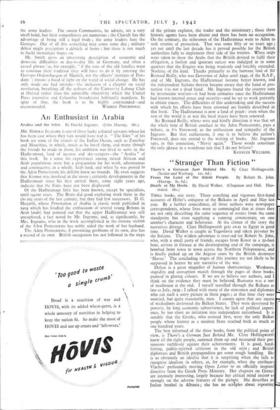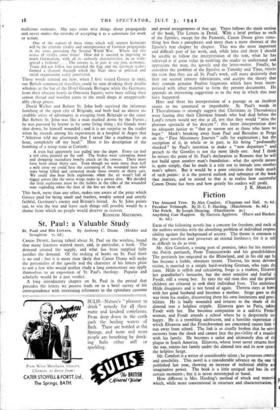"Stranger Than Fiction"
There's a German Just Behind Me. By Clare Hollingworth. (Seeker and Warburg. tos. 6d.)
From the Land of the Silent People. By Robert St. John. (Harrap. 8s. 6d.) Death at My Heels. By David Walker. (Chapman and Hall. Illus- trated. 16s.)
THREE books, one story. Three searching and vigorous first-hand accounts of Hitler's conquest of the Balkans in April and May last year. By a further coincidence, all three authors were newspaper correspondents, whose lives were so commingled that at.times they are not only describing the same sequence of events from the same standpoint but even supplying a running commentary. on one another's character and behaviour. At the climax of the story the narratives diverge. Clare Hollingworth gets away to Egypt in good time. David Walker is caught in Yugoslavia and taken prisoner by the Italians. The wildest adventure is reser ved for Robert St. John, who, with a small party of friends, escapes from Kotor in a zo-foot boat, arrives in Greece at the disintegrating end of the campaign, is bombed from town to town across the Northern Peloponnese, and is finally picked up on the Aegean coast by the British destroyer Havoc.' The concluding stages of this journey are not likely to be surpassed in horror by any narrative of the war.
Defeat is a great magnifier of human shortcomings. Weakness, stupidity and corruption march through the pages of these books, painted in glaring colours. If we are to believe our authors, and I think on the evidence they must be believed, Rumania was a sort of madhouse at the end. I myself travelled through the Balkans as late as July, 1939 ; I talked with many of the statesmen and diplomats who cut such a sorry picture in these pages ; at that time they were worried, but quite reasonable, men. I cannot agree that any excess of wickedness destroyed the Balkan States. They were destroyed by poverty, by long economic subservience, by lack of political experi- ence, by too short an initiation into independent nationhood. It is notable that the Greeks, who resisted best, were the only Balkan people whose history as a modem State reached back as much as one hundred years.
The best informed of the three books, from the political point of view, is There's a German Yust Behind Me. Clare Hollingworth knew all the right people, summed them up and measured their pre- tensions ruthlessly against their achievements. It is good, hard- hitting, public-spirited criticism in the old style ; and British diplomats and British propagandists get some rough handling. She is so obviously an idealist that it is surprising when she fails to recognise idealism in others, as, for example, when she attributes Vlachos' profoundly moving Open Letter to an officially inspired directive from the Greek Press Ministry. Her chapters on Greece are intensely interesting, largely because her critical mind insista so strongly on the adverse features of the picture. She describes an Italian brothel in Albania ; she has no scruples about reporting malicious rumours. She says some wise things about propaganda and never makes the mistake of accepting it as a substitute for work or action.
One of the aspects of these times which will interest historians will be the extreme vitality and omnipresence of German propaganda in the years preceding the Second World War. Where did this access of vitality come from? How did it succeed in imposing so much Germanism, with all its unlovely characteristics, in so wide- spread a fashion? . . . The answer is, in part at any rate, economic. Trade did not follow but preceded the flag, and the German traders formed a channel through which the Nazi ideas of political and social organisation easily penetrated.
These words remind me how, when I first visited Greece in 1931, our British commercial travellers could be seen drinking their double whiskies at the bar of the Hotel Grande Bretagne while the Germans; from their obscure hotels in Omonoia Square, were busy selling their cotton thread and woollen yarns to the small shops at unapproach- ably cheap prices.
David Walker and Robert St. John both survived the infamous bombing of the open city of Belgrade, and both had an almost in- credible series of adventures in escaping from Belgrade to the coast. But Robert St. John was like a man marked down by the Furies ; he was pursued by horror as by some living thing ; his friends were shot down, he himself wounded ; and it is no surprise to the reader when he records among his experiences in a hospital in Argos that "Atherton told me afterwards that I raved like a madman for an hour, completely off my head." Here is his description of the bombing of a troop train at Corinth:
A train had apparently just pulled into the depot. Every car had a red cross painted on the roof. The Stukas were screaming down and dropping incendiary bombs smack on the crosses. There must have been about thirty cars. Even though we were more than half a mile away we could hear the screaming of the wounded men who were being killed and cremated inside those twenty or thirty cars. We could also hear little explosions when the air wasn't full of bigger noises like the noise wings make in a power dive. We decided the little explosions must be the bullets in the rifles of the wounded men exploding when the heat of the fire set them off.
This book, more than any other, makes one aware of the price which Greece paid for being small and fearless, weakly armed and utterly faithful, Germany's enemy and Britain's friend. As St. John points out, to win the war and leave such things still possible would be a shame from which no people would deserve to recover.
KENNETH MATTHEWS.



























 Previous page
Previous page